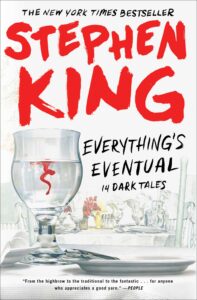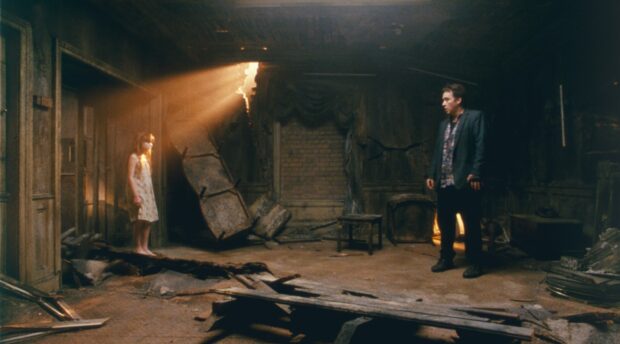Welcome back to Inconstant Reader, the feature column that explores Stephen King’s books in the order they were published — sort of! Warning: spoilers are eventual.
Stephen King’s seventh compilation of short stories and novellas is proof positive that the man is non-stop. Bringing together pieces originally published between 1994 and the anthology’s release in 2002, EVERYTHING’S EVENTUAL is arguably King at his most eclectic.
“What I did was take all the spades out of a deck of cards plus a joker. Ace to King = 1-13. Joker = 14,” said King in an introduction. “I shuffled the cards and dealt them. The order in which they came out of the deck became the order of the stories, based on their position in the list my publisher sent me. And it actually created a very nice balance between the literary stories and the all-out screamers.”
The opening salvo, ‘Autopsy Room Four,’ is a classic bit of Twilight Zoney suspense. In fact, there’s an explicit reference in it to the Alfred Hitchcock Presents adaptation of the short story ‘Breakdown’ by Louis Pollock. Like those stories, a man is about to undergo an autopsy after being bitten by a deadly snake on a golf course. The only problem is that he’s not dead yet, but is paralysed and unable to tell anybody. The goofy ending, in which a doctor rushes in to let them know he’s not dead – only to discover that the lead doctor has found herself holding her patient’s erect penis – is as macabre as they come. (Coming full circle from its influences, it was later adapted into an episode of the anthology series Nightmares and Dreamscapes, which takes its name from another King collection).
From here the book does have a definite fascination with death or near death experiences. In both ‘The Man in the Black Suit’ and the novella Riding the Bullet – originally published six years apart – a son is visited by the vision of a dead mother and races to be by her side. In the first, originally published in The New Yorker in 1994, it’s about a boy who’s brother died from a bee sting. Years later, when he goes fishing, a man who is quite possibly the devil himself appears to him to tell him that his mother is dead and his father intends to molest him. The gripping story won an O. Henry Award, putting King in such prestigious company as Raymond Carver, John Updike, Dorothy Parker, William Faulkner, Joyce Carol Oates and Alice Walker to name but a few.
The three novellas – the title story, Little Sisters of Eluria and the aforementioned Riding the Bullet – are the tentpoles of this strong collection. King states in an introduction that the premise of Everything Eventual came to him in a dream about a person pouring change into the storm drain. It concerns a shadowy organisation who gives lead character Dinky Earnshaw, a 19-year-old high-school dropout, everything he wants in the house they keep him in. It’s slowly revealed that Dinky can influence people with his mind, a skill that Dark Tower fans may recognise as the skills of a Breaker, like Ted in the novella Low Men in Yellow Coats (found in Hearts in Atlantis). Both characters turn up in the Dark Tower novels. (There are foreshadows of Gwendy’s Button Box in this tale too).
For Dark Tower fans, Little Sisters of Eluria is the more direct tie-in with the grand saga. Focusing on an adventure of Roland Gilead, it acts as both a prequel to the whole story as well as a follow-up to The Dark Tower IV: Wizard and Glass. In the course of pursuing the Man in Black across the desert, he is attacked by mutants and rescued by a group of strange nuns who call themselves the Little Sisters – but they are actually vampires. It’s a terrific vignette that may be a good place to start your Dark Tower journey, even if it’s way more fun on your second time around the wheel.
As the penultimate story in the collection, Riding the Bullet – which earned King his seventh Bram Stoker Awards (of 15 to date) – started its life as the world’s first mass-market e-book in 2000. It follows a University of Maine student as he hitchhikes the 120 miles (200 km) south after learning that his mother had a stroke. Like ‘The Man in the Black Suit,’ he encounters an undead presence that gives him a choice between his mother’s life and his own. In a moment of terror, he chooses the latter. It was adapted into a movie starring Jonathan Jackson, Barbara Hershey and David Arquette.
Speaking of adaptations, ‘1408’ is arguably the best know story in the set thanks to the 2007 Mikael Håfström film starring John Cusack and Samuel L. Jackson. A haunted house story of sorts, or ‘ghostly room at the inn’ as King puts it, the short sees a writer spend 70 minutes in a cursed room at a motel – and is irrevocably changed from the experience. Then there’s ‘The Road Virus Heads North’ which despite the title, is not a secret sequel to The Stand. It is, however, about a successful horror writer who buys a painting that begins to disturb him in ways that would make Dorian Gray and Rose Madder blush.
These collections also offer us a chance to see a different side of King. While the vast majority are horror stories, the shuffled deck turns up some literary cards as well. ‘The Death of Jack Hamilton,’ the most recent of the stories in the collection, is a true crime story based on the death of John Dillinger, told from the perspective of Homer Van Meter, a member of John Dillinger’s gang. ‘All That You Love Will Be Carried Away’ is a sad story of a travelling salesman at a crossroads, banking on the lights of a farmhouse to determine his own fate. ‘Lucky Quarter’ is about single mother Darlene Pullen, who finds the titular quarter and it starts to pay off – or is it all in her head? It’s a wistful twist on the monkey’s paw trope.
There isn’t a dud in the bunch. One of my favourites is ‘L. T.’s Theory of Pets, an often hilarious story told from the first-person perspective. It’s about a couple who buy pets for each other that instantly take a disliking to their respective owners, and it all ends in a grim and bloody finale. If you get the audiobook version of this collection, which I highly recommend, you’ll hear King reading the story live to a very amused audience at the Royal Festival Hall in London. Similarly, ‘Lunch at the Gotham Cafe’ follows a couple on the verge of divorce who are attacked by a waiter having a psychotic break. Something this homicidal shouldn’t be this funny, but it really is.
EVERYTHING’S EVENTUAL may be one of the best collections of King’s short stories. It’s certainly the one that showcases the length and breadth of his writing talents. It’s the kind of book you want to hand to people who have pigeonholed him as a horror writer of a certain era. Plus, it’s so eventual, man.
When Inconstant Reader returns, we hit the road with 2002’s From a Buick 8, King’s second book about a supernatural car.







